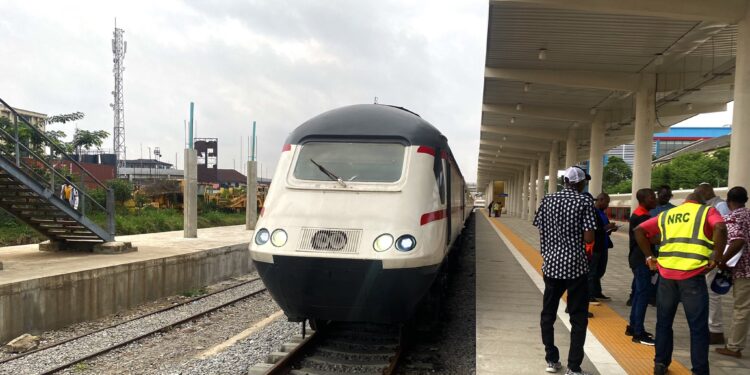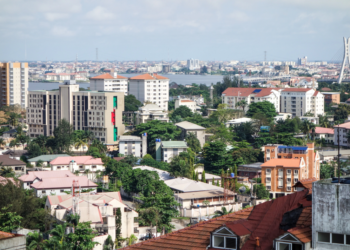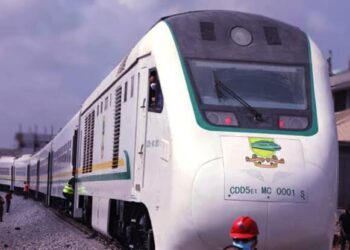The Lagos Metropolitan Area Transport Authority (LAMATA) initiated the trial run for the Lagos Rail Mass Transit (LRMT) Red Line on Tuesday, gearing up for passenger operations slated to begin in the last quarter of the year.
According to Kolawole Ojelabi, Head of Corporate Communications for LAMATA, the test run involved the British rail class 43 HST train and came after extensive engineering, speed, and weight tests.
The statement noted that the successful simulation on Tuesday showcased a track-sharing arrangement with the Nigerian Railway Corporation (NRC), involving all relevant station officers and officials.
“Today, the Lagos Metropolitan Area Transport Authority commenced the trial run for the Lagos Rail Mass Transit (LRMT) Red Line in preparations, after weeks of engineering, speed and weight tests,” the statement read in part.
It further added, “The test run was carried out with the British rail set class 43 HST train.”
The statement highlighted that the British rail class 43 HST train features flexible seating arrangements, comfortably seating 60 passengers per coach for shorter trips and accommodating up to 150 people, including standing passengers, for intracity commutes.
LAMATA also noted that the train can be configured with five or six carriages. Although it can exceed speeds of 120 kilometres per hour, its operational speed is capped at 50 mph due to regulations set by the Nigerian Railway Corporation (NRC).
The statement also emphasized that the Red Line metro rail will significantly reduce travel time between Agbado in Ogun State and Oyingbo in Lagos, cutting it down to just 55 minutes from nearly three hours.
More insights
Providing more insight into the trial runs of the Red Line metro rail, Senior Special Assistant on New Media to Governor Babajide Sanwo-Olu, Jubril Gawat, announced in a post on X (formerly Twitter) that the trial runs for the Red Line project will take four to six weeks.
He noted that there will be four trips per day, two in the morning and two in the afternoon. During the morning peak period, the train will depart from Oyingbo Station (Ebute Metta) at 8:30 am and arrive at Agbado Station in Ogun State by 9:37 am. The second-morning trip will leave Agbado at 10:30 am and return to Oyingbo by 11:37 am.
In the afternoon, the third trip will start at 12:40 pm from Oyingbo Station, reaching Agbado by 1:47 pm. The final trip of the day will depart Agbado at 2:50 pm and arrive back at Oyingbo Station by 3:50 pm.
Gawat also mentioned that during the testing period, the trains will carry different groups of passengers to gather feedback from their experiences.
He confirmed that passenger operations are expected to start in the last quarter of the year, with 20 trips scheduled per day.
“The trains will carry different groups of passengers for the testing period with the hope of getting feedback from their experience.
“Passenger operations expected to start by the last quarter of the year, with 20 trips per day,” Gawat’s post read in part.
What you should know
President Bola Tinubu inaugurated the first phase of the Red Line project on February 29, 2024.
The Red Line is designed to stretch 37km, with the first phase covering 27km from Agbado in Ogun State to Oyingbo, featuring eight strategically located stations: Agbado, Iju, Agege, Ikeja, Oshodi, Mushin, Yaba, and Oyingbo. Construction of this phase began on April 15, 2021.
The inauguration also included a formal agreement signing for the commencement of the Red Line’s second phase, a collaboration between the Lagos Metropolitan Area Transport Authority (LAMATA) and the China Civil Engineering Construction Corporation (CCECC).
The Red Line will share tracks with the Nigerian Railway Corporation’s (NRC) Lagos to Ibadan route, facilitated by a track-sharing agreement signed by former President Goodluck Jonathan.
The Central Bank of Nigeria (CBN) played a crucial role in mobilizing local funding for the project, with additional financial support from three major local banks: United Bank for Africa, First Bank, and Zenith Bank.
Lagos State Governor Babajide Sanwo-Olu had previously announced the acquisition of trains for the Red Line from the United States, with additional rolling stock procured from the United Kingdom in 2023 and China earlier this year.
The Lagos State Government projects that the Red Line will transport 250,000 passengers daily, with this figure expected to increase to 750,000 once the system is fully operational and all additional rolling stock is integrated.























